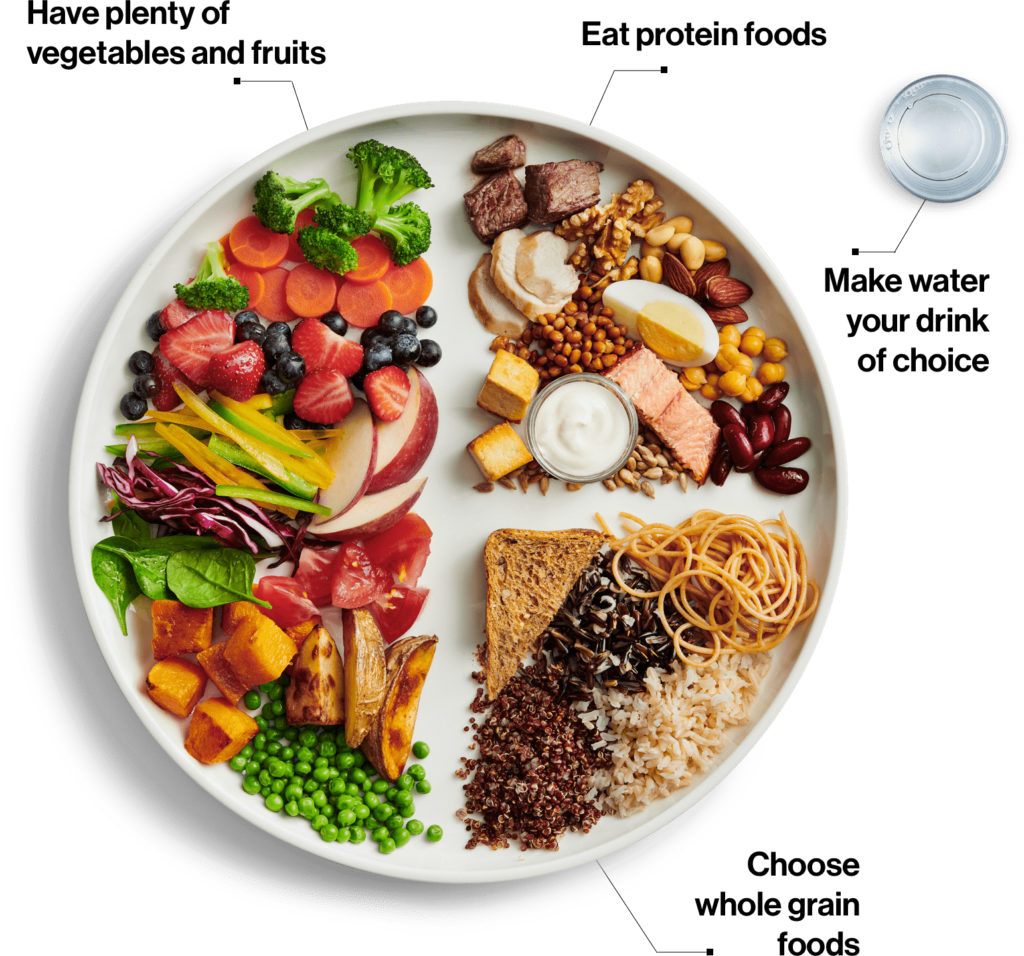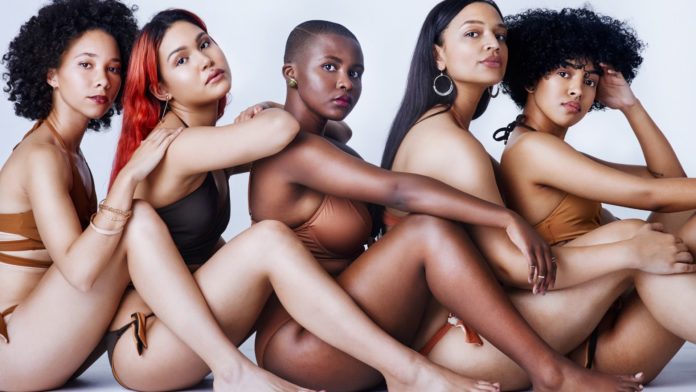We are all about any movement or effort that encourages women to love their bodies. After all, self-love and self-acceptance — and yes, that means embracing all of you, even your flaws — are essential elements to achieving a fulfilling life. If you can’t appreciate your body for what it is capable of and what makes you special, then you will spend your life chasing after an unrealistic goal of perfection. But (and there’s usually a “but”) there is a super fine line between balancing that body positivity and also focusing on your health. Because in some circumstances, your well-being and your self-acceptance do not go hand-in-hand. Focusing on what your body needs for you to be healthy while also focusing on what your body needs for you to be self-confident is work; it takes time, effort and a lot of patience. But it’s arguably some of the most important work you will do in your lifetime.
If you spend time worrying about your body you’re not alone. Do I weigh too much? Do I weight too little? Is it inappropriate to flaunt my curves? Why don’t I have curves? Why don’t I look like the women in those magazines? Is something wrong with me? It’s easy to get trapped in an inner monologue of negative thoughts, focusing only on what you lack or what is “wrong” with you and not focusing enough on what makes you unique and beautiful inside and out. Which is why self-love and body positivity are so essential.
But like we said, balancing self-acceptance and positive health is a tightrope walk that few people manage to execute flawlessly. If you focus too much on body positivity (I’m perfect just the way I am, regardless of my size) then you could be putting your health at risk. If you focus too heavily on losing weight and getting in shape and not enough on accepting yourself the way you are, then you could do irreparable damage to your self-esteem. It’s a dilemma, and extreme actions in either direction could do more harm than good.
Like so many challenging but rewarding aspects of life, especially life as a Latina woman, balance is the key.
The Importance of Body Positivity
If your happiness is completely reliant on someone else telling you that you are beautiful, you are worthy, and they love you, then you are setting yourself up for a lot of disappointment and loneliness in your lifetime. As many of us have learned the hard way, while the love of a partner, family member or friend is important, it’s equally (if not more) crucial to also love and appreciate yourself and the skin you are in. But what does that even mean? What is body positivity?
According to Mallorie Dunn, founder of the body positive fashion line SmartGlamour, in an article for Psychology Today, “to me, body positivity means accepting the body you have as well as the changes in shape, size, and ability it may undergo due to nature, age, or your own personal choices throughout your lifetime. It’s the understanding that your worth and what’s going on with you physically are two separate entities — that no matter what’s happening inside, outside, or to your body, you’re still just as worthwhile as the person next to you.”
If you ask Tess Holliday, the gorgeous, empowering, plus-sized model and body positivity queen, what it means to practice self love, she’ll tell you it’s all about respecting yourself and being proud of your body. When she appeared on the cover of SELF it was a groundbreaking moment for the self-proclaimed fat-positivity activist, and it was the first time a fat woman appeared on the cover of a health magazine. “This is totally surreal to see a fat body on the cover of a health magazine. Thank you SELF for changing the game with me!” Holliday exclaimed on her Instagram page. Holliday coined the hashtag #effyourbeautystandards in an effort to empower women to be confident in their skin and to embrace their own definition of beauty and of health. She doesn’t feel the need to justify her health or defend her body type to anyone, despite the constant “concern trolling” of people who feel the need to comment on her size.
And body positivity is important for everyone, of all sizes. Feeling good in your own skin and having a positive internal relationship with your body can positively impact all of the other external relationships in your life, from romantic relationships to professional relationships and everything in between. But for a lot of people, achieving body positivity is a difficult task. And that is especially true for Latina women in today’s world.
Latina Women Face Unique Health Risks with Real Consequences
It might come as a surprise that women of all ethnicities deal with issues around body positivity. It’s hard to imagine that even in cultures that seemingly value curves and natural beauty, women (and men for that matter) can battle their inner demons of insecurity and can struggle to achieve self-acceptance. But truth be told, even Latinas have a hard time feeling comfortable in their own skin. In fact, they are at just as much of a risk as non-Hispanic whites for developing eating disorders, or perhaps even more susceptible to these body image issues. But the real issue is that in many instances, eating disorders among Latina women often go undiagnosed and underreported.
According to a study published in the journal Body Image, “Latina women are vulnerable to poor body image, eating disorders, and obesity, particularly during the college years.” This could be the result of the influence of media, cultural disparities about the ideal body type and size, and cultural influence on healthy habits and dietary choices. But the fact remains that Latinas are especially vulnerable to poor body image, and ultimately at risk of developing eating disorders.
On the one side of the health body image spectrum, it is clearly crucial that women have body positivity and self-love. But on the other side of the spectrum it’s important that women take measures to protect their immediate health and their long-term wellbeing.
It is important that self-acceptance doesn’t transition into a lack of self-care. Because while it is important to have a positive body image regardless of your body type or size, there are risks associated with having a larger body and carrying more weight. And for people in the Latin community, the risks are more specific and potentially more dangerous than they might be for other ethnic groups.
Latina Women Are More At Risk Of Developing Type 2 Diabetes
The CDC reports that Hispanic people are 50 percent more likely to die from diabetes than whites, and more than 50 percent of US Hispanic men and women are expected to develop Type 2 diabetes in their lifetime. This increased risk can be attributed to several factors; for starters, a lack of awareness about diabetes and the health risks might be partially to blame. In addition, this increased risk might be due to health insurance disparities, cultural eating habits and culinary traditions that lead to unhealthy diets and excess weight in the mid-section among Latinos. And studies suggest that Hispanics are predisposed to store excess fat in the pancreas, which may put them at an elevated risk of developing diabetes later in life.
So clearly this is a bit of a catch 22 for anyone, but for Latina adults in particular. If you have body positivity and you accept your body, curves and all, then you are potentially at an elevated risk of diabetes and all the health complications that come with it. If you don’t practice self-acceptance and you are perpetually working to achieve a different body type or an unattainable standard for beauty, then you are at a higher risk of developing an eating disorder or body image disorder. It seems like you can’t win.
But you can.
Managing Body Positivity and Your Health Comes Down to Balance
Achieving wellness and self-love is a delicate balancing act. At the end of the day, being able to both feel positive about your body, but also feel confident that you are taking the best possible care of your body and your health is a challenging task that requires moderation, patience and education. You need to be as aware as possible about your health, the risks you face as you age and as your body changes, and then you need to make some calculated choices about how to make the best decisions for you and for your body.
You can appreciate the body you have and all that it is capable of, but also work to take the best possible care of that body. You can be simultaneously happy with how you look and also constantly trying to be the best version of yourself. The two mentalities are not mutually exclusive, but again, it’s a super fine line, and you must walk it carefully and with good intentions.
One Final Thought: Body Positivity Does Not Lead to Obesity
As the body positivity movement has ramped up into high gear in recent years, with more body-positivity activists gaining acceptance, visibility and inspiring a new generation of women, there has also been some backlash. Some argue that the body positivity movement is dangerous, or that the movement has gone too far. People suggest that promoting body acceptance at any and every size actually promotes an unhealthy lifestyle and is an anti-diet and anti-health movement.
These criticisms are inaccurate and misguided.
Feeling comfortable in your own skin and being satisfied with your weight does not lead to obesity. There is absolutely not proof that feeling good about yourself, or having positive views of your body size can ultimately lead to illness or weight-related health hazards. The normalization of plus sized women and curvy body-types is not what is causing people to become overweight. In fact, the recent normalization and acceptance of different body types and women of larger sizes has the potential to create a positive change in how women live and how they feel.
A recent study has taken a look at the relationship between self-acceptance and being overweight, and it’s important to look closely at the findings and truly understand what they mean. The 2018 study out of England attempted to look at the connection between the normalization of being overweight and the risk of obesity. The study, published in the medical journal Obesity, aimed to find a link between the recognition and acceptance of plus sized body types with the underassessment of one’s’ weight and ultimately their efforts to lose weight.
The findings indicate “those underestimating their overweight and obesity status were 85% less likely to try to lose weight compared with people who accurately identified their weight status.” So what does this mean? Well, it means that based on the study participants, a person might be more likely to not self-identify as overweight because of the influence of plus-sized models and the availability and marketing of plus-sized women’s wear. It also means that those women who do not self-identify as overweight are less likely to take measures to get in shape, lose weight, and focus on their health. But it does not in any way prove that a woman being satisfied with her fuller figure will cause her to become obese because of that body positivity. It also does not take into account the other factors associated with a woman’s health or wellness habits.

We repeat: there is no danger associated with the body-positivity movement. According to Alexis Conason, Psy.D., psychologist and founder of the Anti-Diet Plan, in an article for Shape, “the idea that showing images of unapologetic fat women is somehow going to create an epidemic of fatness is one of the most absurd things I have ever heard.” She continues to say “it’s almost as absurd as the idea that teaching fat people to hate themselves will make them thin. That’s what our culture has been doing for the past decade and I certainly don’t think that has led to anything except for increased rates of eating disorders, more health problems, and epidemic levels of body hatred in people of all sizes.”
So while body positivity alone cannot cause obesity, it’s certainly a complicated topic. There is a fine line between feeling comfortable in one’s skin, and being focused on your own wellbeing if you are at an elevated risk of health issues. Body acceptance does not need to conflict with one’s goals to live a healthy lifestyle. And the really important takeaway here is that everyone, of any and all sizes, should be able to both feel positive about their body and also feel confident that they are in good health.
For Image credit or remove please email for immediate removal - info@belatina.com








































